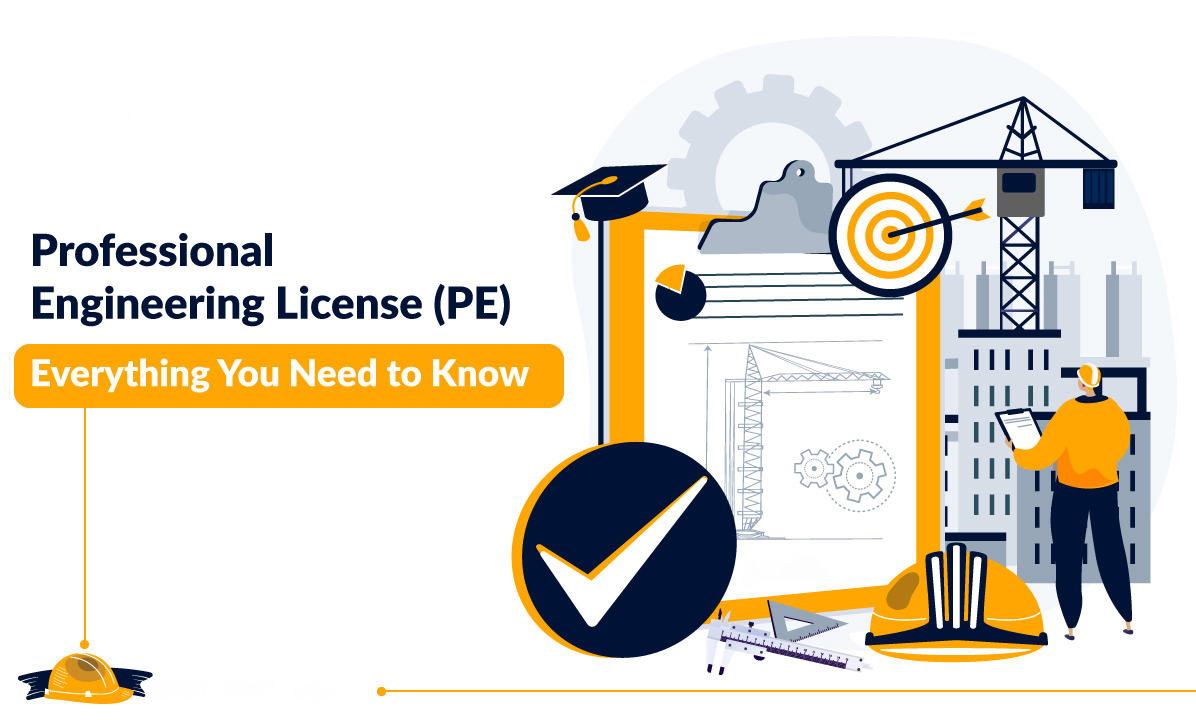
Professional Engineering License (PE): Everything You Need to Know
Diving into the world of engineering, did you know only 20% of U.S. engineers hold the esteemed Professional Engineering license? It's more than just a title; it's a mark of top-tier expertise and trustworthiness. Clients rely on licensed professionals with proper credentials, ensuring trustworthiness. Similarly, employers value professionals who can assume necessary responsibilities. Experts combine specialized expertise, ethical conduct, and quality assurance to prioritize safety and enhance our lives.
Join us as we unpack what it means to have this license, why it matters, and the journey to earning it in this blog.
How to Qualify as a Professional Engineer
There are three basic steps to becoming a licensed engineering professional; however, many states require additional steps to obtain a license.
- Education: Professional Engineering candidates essentially need a bachelor's degree from an EAC/ABET-accredited program.
- Experience: Another requirement is a minimum of four years of experience under the supervision of a professional engineer.
- Examination: The Fundamentals of Engineering (FE) test must be successfully passed by applicants before they may attempt the Principles and Practice of Engineering (PE) test.
Benefits of Having a Professional Engineering License
- Recognition: Obtaining a Professional Engineering license provides engineers with numerous resources and networking opportunities that will help them advance in their careers. It enables engineers to gain the recognition required to launch and advance their careers.
- More Growth: Being a licensed engineering professional raises status, emphasizes leadership potential, and shows full dedication to the profession. A Professional Engineering license opens more career opportunities and can be a deciding factor in some employment situations.
- Higher Salary: Professional engineers typically earn more than non-licensed engineers. According to a 2020 report by the American Society of Civil Engineers (ASCE), civil engineers with a Professional Engineer license earned a median salary of $121,000, while civil engineers without a Professional Engineer license earned $31,000 less.
- Authority: Obtaining a Professional Engineering license gives more decision power. Engineers are able to work as consultants in engineering, as expert witnesses in engineering scenarios, or even create their own engineering companies. Only a licensed engineer may prepare, sign, seal, and submit engineering designs, plans, and drawings.
- Flexibility and Security: A Professional Engineering license can increase job security during downsizing or outsourcing. It can also broaden career options outside of the traditional corporate environment by allowing them to launch their own venture. A Professional Engineering license enables an engineer to work as an engineering consultant or private practitioner.
Responsibilities of a Professional Engineer
This section presents a representation of the responsibilities that Experts must fulfill in regard to their profession and ethics.
Professional engineers are required to abide by regulations set forth by several governmental bodies, including the Department of Transportation (DOT), the Federal Emergency Management Agency (FEMA), the US Environmental Protection Agency (USEPA), and any applicable state regulatory agencies or municipal governments. Professional engineers are responsible for producing, signing, sealing, and submitting engineering designs, plans, and drawings for examination by a public body or sealing engineering work for both public and private clients. For quality assurance and quality control, professional engineers undertake field inspections and review all plans, drawings, and product specifications.
Professional engineers uphold the highest moral and ethical standards because they are held responsible for the consequences of their work and the people they impact. They must always conduct themselves with the utmost sincerity and integrity. Professional engineers must refrain from performing any acts or following any processes that could mislead the public in favor of serving the public interest. Competing interests may not affect a professional engineer's performance of their obligations.
Engineers should alert the proper authority if they believe someone else is engaging in unethical or illegal behavior so that action can be taken. Professional engineers are directly liable for their professional actions, but if their interests cannot be adequately preserved, they may seek compensation for services resulting from their practice for reasons other than willful misconduct.
A Professional Engineering license ensures candidates accomplish new career milestones and adds new responsibilities to ensure quality, safety, and adherence to standards. Experts are in high demand, and companies in the Architectural, Engineering, and Construction (AEC) domain are actively seeking licensed professionals.
Sterling Support Services, a unit of iQuasar LLC, has active clients in the construction industry, where there is a high demand for Experts in various domains. We have a team of professionals who ensure that candidates are placed based on their PE license, skills, certifications, and interests.
To know more about how we can help you
Set Up A Meeting With Our Expert!
Recent Posts
Accelerating Project Timelines with Expert Civil Design Support
Rebuilding Florida After Hurricane: Key Steps and Support Services
Delivering Land Development Plans Within Tight Deadlines – A Case Study
MON-SAT 8:00-9:00
+91 69 863 6420





